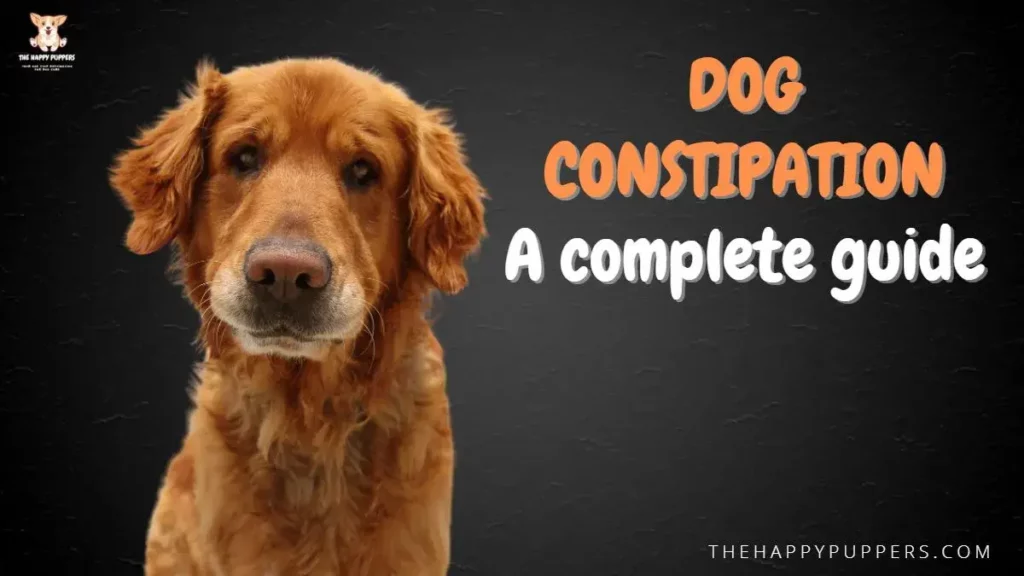Yes you read it right! Dogs too suffer from constipation just like humans. Constipation refers to difficulty, or inability in passing stools at a regular time of the day. Dogs generally go for poop once or twice daily.
Topics covered in this blog post
What is constipation in dogs?
If your dog is suffering from constipation, you might notice you dog:
- Straining to defecate.
- Not passing stools at all.
- Producing rock hard stools after applying a lot of pressure.
In serious cases, dogs might retain the hard and dry fecal matter in their intestine. This situation is referred to as OBSTIPATION. In this condition, there is so much fecal matter in the intestine of the dog that it becomes compacted and makes it impossible for the dog to pass. Thus, the dog might not defecate at all under this condition.
Symptoms of dog constipation:
- Absence of defecation for a few days
- Hard and dry stools which have the consistency of a pebble
- May also pass mucus during defecation
Other symptoms of severe constipation:
Tenesmus: When the dog has to put in a lot of strain and effort to pass stools with very little output. The dog might also produce a very small amount of liquid fecal matter containing blood.
Dyschezia: difficult or painful defecation process.
What causes constipation in dogs?
Under normal conditions, feces travel through the length of the digestive tract and reach the colon. In colon, the electrolytes and water get absorbed from the mass.
During their journey in the colon, the feces travel via peristaltic movement of the intestine. Peristaltic movement is a rhythmic involuntary contraction and relaxation of the intestinal cells which pushes the mass forward. If the peristaltic movement is slowed or hindered in any manner, the feces will get stuck in the colon and won’t be able to move ahead towards the anus. The longer the feces stay in the colon, the more moisture it will lose, becoming dry, hard and eventually impossible to pass through the anus.
Scientists refer to rock hard stools as concretion.
Primary reasons behind dog constipation:
There are numerous reasons why your dog might be suffering from constipation:
- Absence of adequate amount of exercise
- Abscessed or blocked anal sacs
- Blockage in the colon
- Presence of tumor in the colon
- Too much or too less fiber amounts in diet
- Enlarged size of the prostate gland
- Too much of self grooming can lead to collection of body fur in the stool making it difficult to pass.
- Presence of matted hair around anus region due to obesity or lack of grooming.
- Ingestion of stones, dirt, bones, toy pieces, plat etc which can get caught in the intestinal tract making the stool difficult to pass.
- Side effects of NSAIDs or other medications like antihistamines, diuretics and antacids.
- Dehydration due to lack of water or other illness
- Neurological issues or nerve injuries
- Pelvic trauma
- Hyperthyroidism or parathyroid disorders
- Central nervous system problems
- Surgery (drugs administered before, during or after surgery can lead to constipation)
- Orthopedic trauma to the dog which causes pain to him/her when assuming defecation position.
Pin this article for later
 |
| The complete guide to understanding dog constipation |
Other likely reasons for constipation in your dog:
Yeast infection:
Candida albicans is the main source of yeast infection in dogs. It can cause urinary tract infection (UTI). Not only does UTI and constipation share similar symptoms, UTI can also lead to constipation. If it is painful for your dog to squat to pass urine, your dog will try to avoid that position even for defecation. Thus, your dog may try to not defecate due to the UTI. Absence of defecation can lead to feces build up in colon thus causing constipation.
Candida albicans is the main source of yeast infection in dogs. It can cause urinary tract infection (UTI). Not only does UTI and constipation share similar symptoms, UTI can also lead to constipation. If it is painful for your dog to squat to pass urine, your dog will try to avoid that position even for defecation. Thus, your dog may try to not defecate due to the UTI. Absence of defecation can lead to feces build up in colon thus causing constipation.
Poor absorption of nutrition:
Overgrowth of bad bacteria can lead to poor nutrition absorption from the digestive system. This might lead to absorption of too much or too less water from the intestines causing constipation.
Which dogs are most affected by constipation?
Constipation is mostly observed in older or senior dogs as they suffer from strenuous bowel movements. However, this condition can affect any dog who may have or or more of the above mentioned constipation reasons.
How to identify if your dog is suffering from constipation? When is it an emergency?
- Your pup has not passed stools in the last two to three days.
- Your dog cries, strains, whimpers or crouches during the process of defecation.
NOTE: These symptoms are also indicative of urinary tract infection. Thus, do not delay in consulting your veterinarian.
What information do you need to provide to the vet for an effective treatment?
When you consult your vet, make sure to provide the following information as this can be very crucial to the course of treatment:
- The last time your dog passed stools
- The consistency and color of the stools passed the last time
- Whether there have been any recent changes in the diet or routine of your dog
- If your dog has eaten any non-food items (bones, plastic anything)
- If your dog is experiencing pain when trying trying to pass stool
- Any recent drug administration
- Signs of discomfort or distress like bloated appearance, lethargy, vomiting
- Recent injuries
What the veterinary exam might consist of?
On the basis of the severity and the duration of the symptoms, your vet may perform the following examinations:
- Neurological exam
- Abdominal palpitation
- Rectal examination
- X ray of the abdominal region
- Colonoscopy or ultrasound
- Urinalysis
- Complete blood count
How is constipation in dogs treated?
Your veterinarian might prescribe one or more of the following treatment options depending on the severity of the constipation in your dog:
- A laxative agent or stool softener
- Medication to increase or enhance the large intestine’s contractile strength.
- A high fiber commercial dog food like canned dog food as it has high moisture content.
- Make sure your dog has access to plenty of fresh water and electrolytes
- Increase in the duration as well as intensity of the exercise
- Add a fiber source to the diet of your dog like wheat bran, canned pumpkin or Metamucil (fiber supplement).
- Administration of an enema. An enema must be administered by a professional and never at home (there is a risk of injury or toxicity if administered incorrectly).
In case your dog has extreme constipation, the following interventions might become necessary:
- Manual removal of the stuck feces
- Administration of drugs to improve the colon function or block the production of certain enzymes.
- In extreme cases, surgery might be the only option. In surgery, also known as colectomy, some sections of the colon might be removed.
Consequences of constipation going untreated:
If your dog is suffering from constipation and it goes untreated, it can lead to obstipation. He or she might not be able to relive their own colon by themselves, In such a situation, the colon gets packaged with a large amount of feces, in turn leading to unproductive straining during defecation, appetite loss, lethargy and vomiting.
Home remedies for treating dog constipation:
Always consult our vet before starting your dog on any of the following home remedies or making any changes to his or her diet plan.
- Pumpkin: This is one of the most well known home remedies for treating constipation in dogs. Pumpkin has a high water content and acts as an amazing fiber source. You can either provide your dog fresh pumpkin puree or canned version of the same. Add the puree with his or her regular food.
- Bran (oat and wheat): Bran tends to act as a preventive option for constipation. Consult your vet on how much bran to add to your dog’s diet.
- Psyllium seed (powdered form): Psyllium seed has the tendency to pull water into the stoll which helps the stool to move along the digestive tract easily.
- Digestive enzymes: Digestive enzymes and probiotics can work wonders in preventing constipation in your dog. Probiotics will proliferate in the large intestine replacing the bad bacteria with the good ones and aiding in digestion.
- Switch to canned food for a while: Kibbles tend to cause constipation due to their very low water content. Try switching your dog to canned food for a while. Canned food owing to the presence of more moisture, should be easier to pass in stools.
- Ginger and beef or chicken broth: This is a very helpful constipation home remedy. Mix ¼ teaspoon of grated ginger with half a cup of beef or chicken broth. Gingers helps to soothe upset tummies. Furthermore, both broth fat and ginger help to get stool moving smoothly through the digestive tract.
- Aloe Vera juice: Aloe Vera juice contains mild laxative properties for both humans and animals. A small dose of aloe Vera juice mixed into your dog’s food or water can help in moving the stool through the digestive tract. Aloe Vera also possesses anti-inflammatory and soothing properties which can help calm as well as heal ant digestive discomfort which your dog might be facing along with constipation.
- Apple cider vinegar: Despite of the minimal amount of research available on apple cider vinegar (ACV), it is safe to use for dogs and is potentially an amazing home remedy for constipation. ACV promotes the growth of healthy gut bacteria. A small amount of ACV added to the water or food can help with constipation. For more amazing benefits of ACV, click here.
- Coconut oil: Coconut oil when consumed, the medium chain triglycerides (MCT)’s get converted into monoglycerides as well as free fatty acids in the digestive tract. These then enhance the immune system of your dog to better fight against harmful parasites, bacteria and viruses. The healthy fats present in coconut oil have the property to destabilize the membrane of harmful bacteria and cause its disintegration. Coconut oil also helps to heal the inflamed tissue of the digestive tract. To know more about the super amazing benefits of the wonderful oil, click here.
- Olive oil: Olive oil is a great option to treat mild constipation in dogs. In case of small dogs, add 1 teaspoon of olive oil per 10 pounds of your dog’s body weight with his or her regular food. If your dog weighs 50 pounds or higher, add 1 tablespoon of the olive oil. Mix the oil with our dog’s food and administer it twice a day.
- Fluids: Last but not the least, fluids are extremely important in preventing and resolving the problem of constipation in both dogs and humans alike. Lack of water or fluid intake can lead to constipation. Thus, if your dog is suffering from constipation, increase his or her fluid intake. Make sure he or she is getting a lot of fluid and electrolytes so that the intestinal tract is hydrated making it easier for him or her to pass stools.
It is best to use only one home remedy at a time. If you use more than one, chances are your dog might land up with diarrhea. Always consult your vet before trying any of the home remedies.
 |
| If your dog has mild constipation, home remedies are the best option as preventive measure |
Homeopathic remedies for dog constipation:
The identification of the correct homeopathic medicine for your dog depends on the symptoms he or she is exhibiting. The following are a few homeopathic treatments you can use to relieve your dog of constipation depending on the symptoms shown:
Lycopodium: Use this homeopathic medication in case your dog is suffering from constipation or diarrhea along with flatulence. The temperament of the dog would be aggressive yet guilty. The dog will have a history of frequent urinary tract infections associated with the presence of liver disease.
Mercurius solubilis: The dog feels trained but never feels like he is done with defecation. Thus, constant unproductive squatting might be observed during walks or in the yard. There might also be presence of mucus and blood in case they do defecate a little. The dog would try to avoid too hot or cold conditions.
Nux vomica: Used for dogs suffering from constipation or diarrhea with constant ineffective urges to go. These dogs might exhibit a very irritable temperament with increasing grumpiness as the illness progresses further.
Pulsatilla: The dog would exhibit the symptoms of little thirst and discharge, stools would be bland with very little odor, the color of the stool would change a lot. The constipation might alternate with diarrhea. The symptoms are usually worse at night or post meals. Temperament wise the dog would display sweet, cuddly and attention seeking behavior.
Silicea: This homeopathic medicine is administered if your dog has been suffering for some time. Such dogs prefer to be in a hot environment. Since it is hard for them to push the stool out, they constantly feel the urge to defecate.
Personal experience:
Delta had a mild case of constipation a few months back. He was finding it very hard to defecate and his stool would have some blood in it too. After doing some research he was started on coconut oil, one tablespoon twice a day with meals and was administered one dose of laxative. His poop has been regular and strain free ever since.
Conclusion:
In this article, I have covered the causes, treatment as well as homeopathic and home remedies for treatment of constipation in dogs. Has your dog ever suffered from this ailment. If yes, what did you do to help?
If you have any queries, feel free to put it in the comment section below. You can also reach out to me on any of my social networks. If you found this post informative, consider subscribing, so that I can send you all dog care tips and information directly to your inbox.
Thank you..



